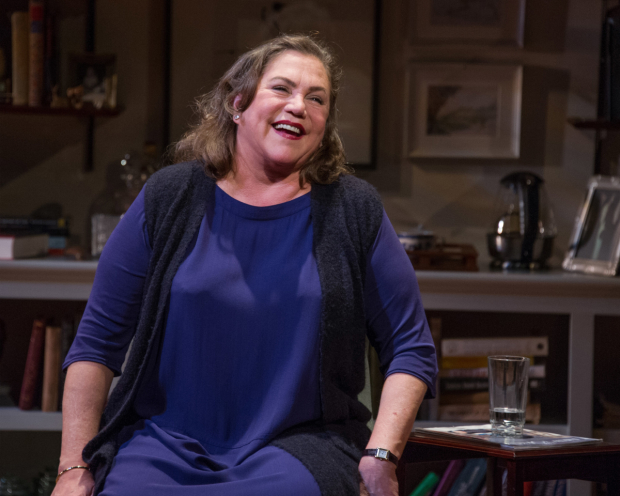
(© C. Stanley Photography)
The Year of Magical Thinking, currently receiving a moving production at Arena Stage starring Kathleen Turner, is based on the 2005 best-selling memoir by novelist and essayist Joan Didion. It is the story of how Didion dealt with dual forms of grief: first, at the sudden death of her husband, writer John Gregory Dunne, when their grown daughter, Quintana, was in a coma; and second, at Quintana's subsequent death not long afterward.
The play begins in the couple's Upper East Side New York apartment, with Didion recalling the events of the evening her husband died. She and her husband had been visiting their daughter in the hospital and had decided to go home, make a fire, and fix dinner. "It will happen to you," she says. "I'm telling you what you need to know."
Her husband was in his office, while she brought him a drink and set the table. Then she brought him a second drink. He asked her a question, then fell on the table. She thought he was making a joke, until he fell on the floor. In an instant, as Didion notes, life "as you know it ends." With John's death, their incredibly close relationship of 40 years ended.
The beginning of the play is devoted to the year Didion spent in a state of "magical thinking," waiting for her dead husband to come back because, as she says matter-of-factly, "I was in no way prepared to accept this news as final: there was a level on which I believed that whatever had happened remained open to revision." She knew she appeared to be rational, and her very own social worker describes her as a "pretty cool customer." Yet she couldn't give away John's shoes, because she feared he wouldn't come back if she did. The play, like Didion's book, travels through the hills and valleys of grief she experiences after Dunne has died and, later, after the death of Quintana.
Despite the seriousness of the material in Didion's story, the play is not depressing, in part because Didion's voice does not weep or mourn. She clearly misses her husband and her daughter, but she is also intelligent enough to recognize the absurdity of her situation. For instance, she wonders if she could avoid her husband's death on the West Coast because of the time difference. If she got him there quickly enough, she asks herself early on, could she expect a happier outcome? Didion's humor is perfectly matched by Turner's subtle acting. Turner lights up Didion's memories, many of which are inspired by nature: the sound of the surf in Hawaii; the color of her daughter's hair when the sun touches it. Director Gaye Taylor Upchurch keeps Turner's broad vocal range primarily in Didion's preferred voice: cool, quiet, collected. It is the voice of many of Didion's fictional characters.
But Upchurch also takes advantage of Turner's basso on occasion. She varies the meter of Didion's lines, so that there is tremendous variety in the show's one hour and 50 minutes. Throughout that time, she allows Turner to prove her beliefs: grief is sporadic. There is nothing logical about it. It comes and goes.
Daniel Zimmerman's set is the modern Didion-Dunne New York apartment, showing a sofa, large wooden desk, painting, and bookcase overflowing with books and photos. Costume designer Kathleen Geldard dresses Turner in a long-sleeved, purple silk dress over black slacks, and covered with a long black woolen vest. Roc Lee's original music and sound, which underscores the show with the sound of Honolulu's surf, is gentle and persuasive. Jesse Belsky's lighting is subtle, growing increasingly dark toward the end.
This Year is cathartic and intense. It is particularly astonishing that the author, who endured so much pain, does not simply reflect that pain back at the audience. Instead, in the process of exploring the depths of what it means to accept loss, she brings us through the intellectual understanding of bereavement, forecasting our future losses and matter-of-factly stating what is to come for us. That, in and of itself, is its own form of magical thinking.









